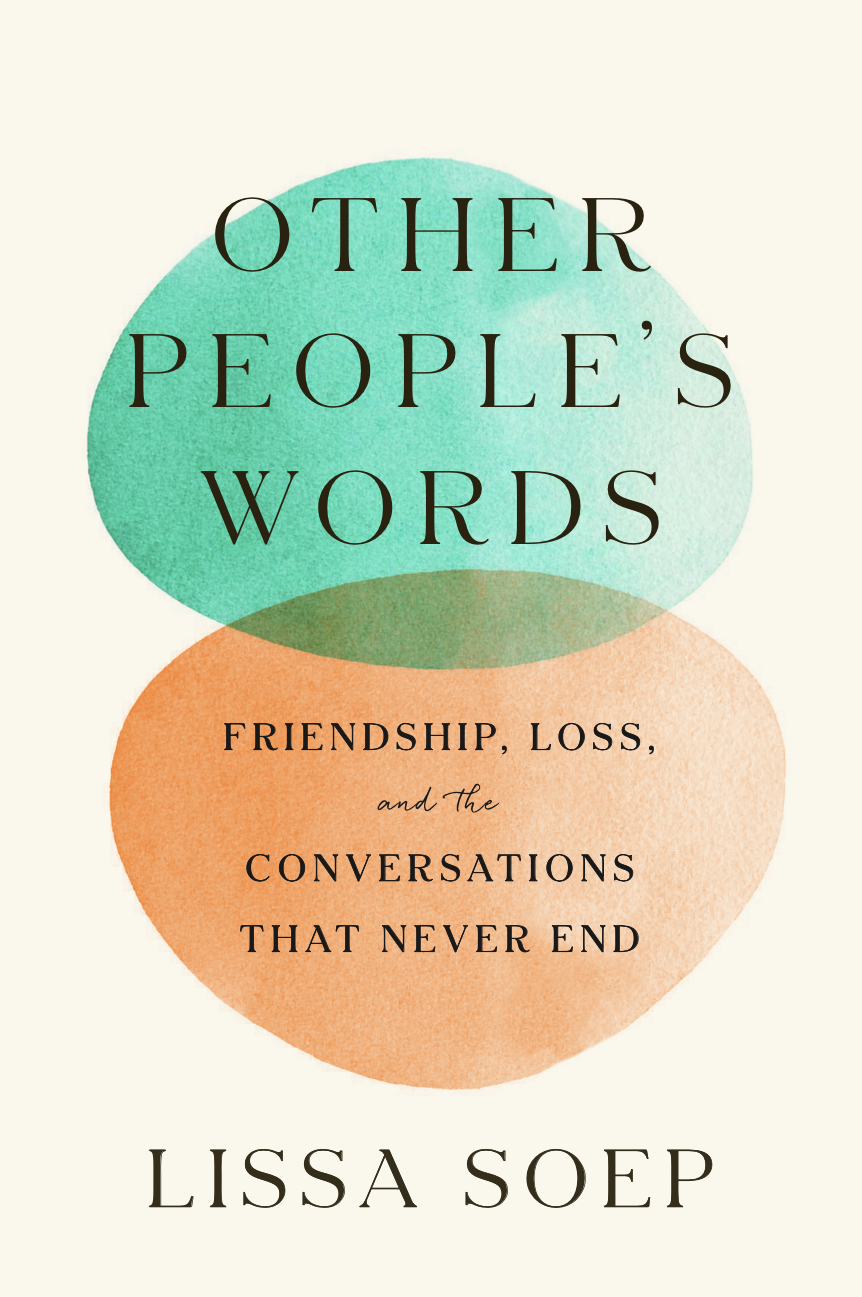A memoir about friendships, loss, and language—a stunning affirmation of the conversations that shape and sustain us, even in the presence of death.
-
“Remarkable . . . A profound meditation on the first-order experiences of life: friendship, love, death, carrying on in the face of great tragedy. This is a book to help you remember what is meaningful in this life.”—Alexis Madrigal, Forum, KQED-FM
“Engaging and deeply thoughtful.”—San Francisco Chronicle
“Moving . . . Anyone who has lost a loved one and still seeks their voice will appreciate this pensive book.”—Booklist
“Other People’s Words is an essential meditation on the relationship between love, loss, and language. How does speech undo the boundaries between you and me, between self and other? How do we create ourselves, and our intimacies, through our words? This book will fundamentally change how, and for whom, you speak.”—Cyrus Dunham, author of A Year Without a Name
“It’s rare to find a book like Other People’s Words, which creates its own delicate atmosphere and populates it with such unforced care that every blade of grass, and every word, seems to glow with its own mysterious purpose, only to discover that you are yourself inside that little world, breathing its air, which is all around you, and that one of its mysterious purposes is you.”—Jonathan Rosen, author of The Best Minds
“Soep has given us a gift with this book. It is a treasure map to meaning in life’s hardest moments and the exact book on grief I desperately needed. She is a celebrator of life, and, in so doing, shows us that love lives on forever.”—Laurel Braitman, author of What Looks Like Bravery
“A moving meditation on the role of language in mitigating grief and loss.”—Amy Fusselman, author of Savage Park
“Other People’s Words illustrates how absurd the illusion is that we are separate. We don’t just whisper into each other’s ears; rather we speak to, through, for, and as each other. This book grapples beautifully with that truth and is genuinely enlightening. Just magnificent.”—Rob Delaney, New York Times bestselling author of A Heart That Works
“Other People’s Words is one of those books that changes you forever. Now I can hear the ‘double voicing’ in my own life: the ways the language of my past—of dear friends and family—has fused into and shapes the language of my present; how it keeps people I have lost with me always.” —Peggy Orenstein
-
What if the great love of your life is friendship?
In their twenties, Lissa Soep and her boyfriend forged deep friendships with two other couples—Mercy and Christine; and Emily and Jonnie—until, decades later, Jonnie died suddenly, in an accident, and Christine passed away after a mysterious illness. Christine had been a writer, Jonnie a storyteller. Lissa couldn’t imagine a world without their letters, postcards, texts—a world without their voices. Then she found comfort in a surprising place. As a graduate student, she had studied the philosophy of the Russian critic Mikhail Bakhtin, who wrote about the many voices that can echo through a single person’s speech. Suddenly, Bakhtin’s theory that our language is “filled to overflowing with other people’s words” came to life. Lissa began hearing Jonnie and Christine when least expected. In a conversation with Emily, a familiar phrase was spoken, and suddenly, there was Jonnie, with his riotous laugh, vibrant in her mind. Mercy recited an Adrienne Rich poem in just the way Christine used to and, for a moment, Christine was with them in the room.
Other People’s Words shows us how we carry within us the language of loved ones who are gone, and how their words can be portals to other times and places. Language—as with love—is boundless, and Other People’s Words is an intimate, original, and profoundly generous look at its power to nurture life amid the wreckage of grief. Dialogues do not end when a friendship or person is gone; instead, they accrue new layers of meaning, showing how the conversations we share with those we love continue after them, and will continue after us.
PRODUCT DETAILS
ISBN: 9781954118355
Price: $28.00
On-sale date: 4/16/2024
Weight: 1.74 lbs. -
Itaru Sasaki bought the phone booth before the tsunami hit in 2011. Before thousands of people were killed or went missing from towns like his, along the coast of Japan. He had set up the booth in his garden to talk to his cousin, who had recently died. It was painted white, with paned windows and a tiny, pale green roof of oxidized shingles. Itaru closed himself into the booth and dialed up his cousin using the heavy black rotary phone inside. He called it kaze no denwa, the wind telephone. It carried his words on the wind.
Then came an earthquake under the sea and its catastrophic waves. Soon grievers other than Itaru showed up in his garden to use the wind telephone. They dialed numbers for destroyed lines that didn’t ring in ruined houses.
“Hello.”
“I’ll be in fourth grade.”
“Grandma’s fine.”
“I joined the tennis team.”
“Everyone is waiting for you,” one man said on a call to his wife, years after she’d disappeared. “I’ll build the house in the same place. Eat something—anything. Just be alive, somewhere, anywhere.”
He reached the person he’d been longing for and then hung up, stepped back into the world. Like glimpsing the precise profile of a lost lover on the face of a stranger until, inevitably, the figure in the crowd takes back its own outlines. Like waking from a dream of your dead father brushing your bangs from your eyes. I wonder if the people on the other end of the phone stay the same age despite the passing years, how the conversations change over time.
Callers listen for voices, remembered and longed for, and produce two sides of a half-uttered conversation that is at once ordinary and magical. Feeling the weight of the receiver in their hands, the visitors say hello, fiddle with the cord, its length a kind of evidence that a connection is being made and with it, the split-second possibility of a person picking up. The silence on the other end of the line is an opening to conjure the vital words of others. The living keep shaping their language around the voices of their dead. At least their lost ones aren’t all-the-way gone anymore, for as long as the conversations last.
I had two friends, Christine and Jonnie. Christine exited slowly, Jonnie all at once. Again and again, I have sought them out in places like Itaru’s booth, where the usual rules of conversation give way. Places like my own wild mind making sense of a world with people missing.
This is what many of us do when we need to speak with and through loss. We find our way to spaces where split-seconds stretch open and fill with conversation, real and imagined. In grief, our voices find life through the dialogues they contain.
It was a Russian philosopher, Mikhail Bakhtin, who taught me to notice these layers of meaning within language. My relationship to Bakhtin formed along the edges of his books, through notes I crammed into the margins over decades. With time, Bakhtin evolved from a scholar I studied to a spirit pre- siding over my deepest loves and losses. He showed me that it’s possible to daydream other people’s words into existence, to conjugate silence into speech. From Bakhtin, from Christine, from Jonnie, I discovered something essential: that language is teeming with voices, past and present, and meanings too unruly and inexhaustible to pin down—an “inner infinity,” which is itself a consolation.
LISSA SOEP is senior editor for audio at Vox Media and special projects producer and senior scholar-in-residence at YR Media (formerly Youth Radio). She has produced award-winning radio stories for NPR and other outlets, and since 2020, she has edited narrative podcasts with Vox Media for Apple, Spotify, Audible, and Luminary and established the Vox Media Podcast Network Audio Academy, a learning and speaker series for aspiring and veteran audio makers. For six years, Lissa was a part of the Youth and Participatory Politics research network, a group of scholars brought together by the MacArthur Foundation to shift the paradigm on how we understand and promote youth civic life in digital times. Lissa is a senior civic media fellow at the Annenberg Innovation Lab and advisor to the Civic Imagination Project at the University of Southern California. She has a PhD from Stanford, where she studied education, social theory, and linguistic anthropology with leading Bakhtin scholars. She lives in San Francisco.


